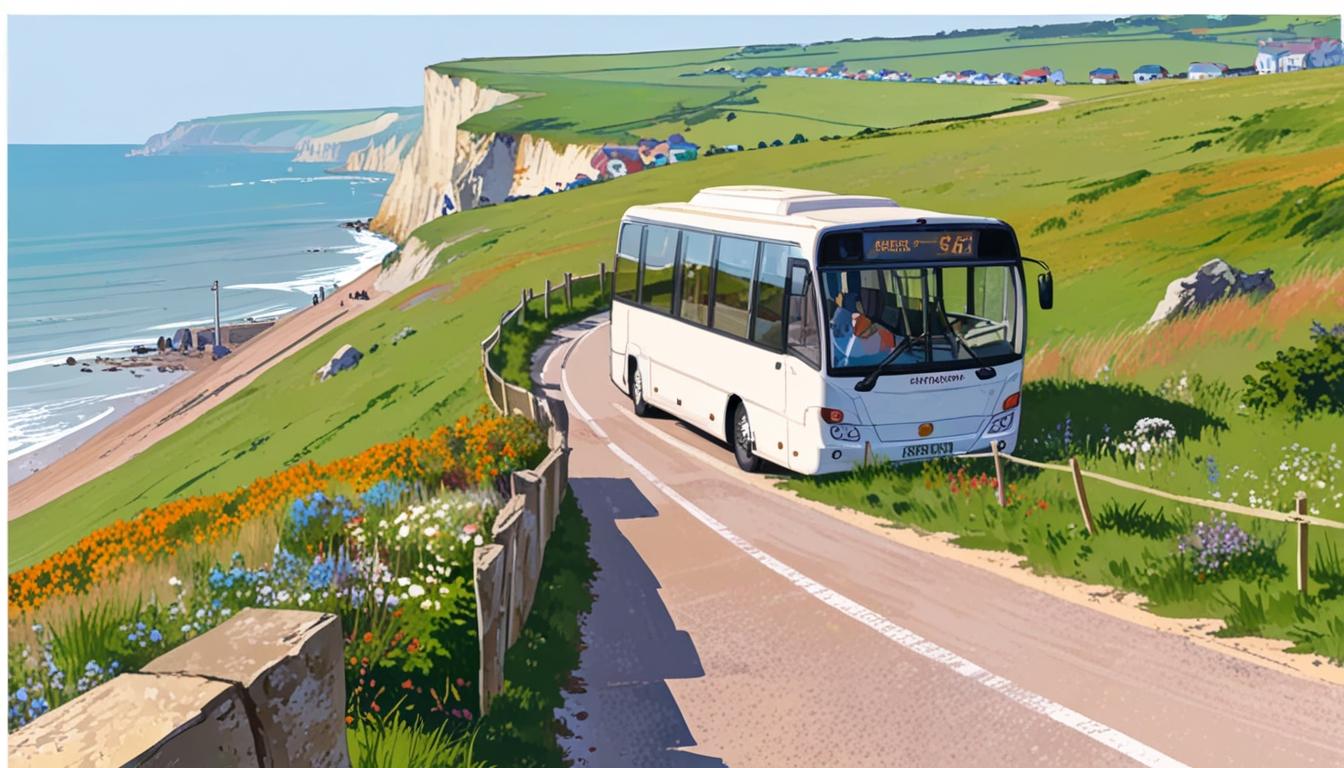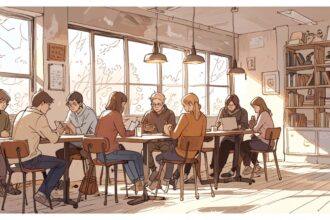The National Trust’s recent ban on tourist coach parking at Birling Gap and the Seven Sisters has led to increased road congestion and safety hazards, with residents warning that the intended environmental protections are being undermined by chaotic drop-offs and reckless driver behaviour.
The National Trust’s recent decision to prohibit tourist coaches from parking at Birling Gap and the iconic Seven Sisters has sparked significant backlash from local residents, leading to increased congestion and safety concerns in the area. The controversial ban was implemented last month as part of an effort to mitigate the damage caused by a dramatic rise in visitor numbers, which have surged from approximately 350,000 in 2018 to around 600,000 last year.
Phil Myerson, a 75-year-old local resident, expressed his frustration, stating, “The coach ban hasn’t come a moment too soon but it has completely backfired. Tourists are wrecking this place. If anything, they are causing more damage now than they were before.” He highlighted the pressing issue of coach operators disregarding safety guidelines, with passengers being dropped off on the narrow roads, creating obstructions for other vehicles and endangering lives.
Witness reports indicate that coach drivers are parking their large vehicles on verges, effectively blocking access for residents and emergency services. Myerson noted that as tourists spill out onto the roads, they contribute to environmental degradation by trampling over delicate wildflowers and grasslands during heatwaves, transforming the area into a “dustbowl.”
The National Trust’s ban marks an unprecedented move in its policy toward coach access at one of its attractions. The decision was made in response to the escalating damage identified at Birling Gap and the Seven Sisters caused by the influx of visitors, a trend that correlates with the site’s rising popularity as a picturesque location featured in numerous films, TV shows, and music videos.
Jon Ledham, a local walker, echoed concerns, stating, “The coach drivers are flouting safety laws by dropping their passengers directly into the road or grass verges. That needs to be stopped and steps need to be taken to ensure it stops.” Meanwhile, another resident, Lloyd Monk, 65, pointed out a notable increase in visitors from South East Asia, many of whom are primarily interested in capturing picturesque snapshots before moving on to subsequent locations.
Dot Skeaping, 80, a former National Trust worker living close to the cliff’s edge, remarked, “The National Trust wants to welcome people to Birling Gap but it wants them to see it at its best.” Skeaping also noted that the ban on large coaches is beneficial as they often arrive in significant numbers and can detract from the scenic value of the site.
In response to the outcry, a spokesperson for the National Trust urged visitors to park responsibly and consider local residents, encouraging coach operators to use designated parking facilities nearby. They emphasised that the ban is not a sweeping policy change but a targeted action to address specific problems at Birling Gap and the Seven Sisters, while still welcoming visitors arriving by various other means.
As the situation develops, residents are calling for more stringent enforcement of the ban and additional measures to ensure visitor safety in the area.
Source: Noah Wire Services
- https://www.telegraph.co.uk/news/2024/03/12/cotswolds-bourton-on-the-water-business-tourist-coach-ban/ – This article discusses the potential ban on tourist coaches in Bourton-on-the-Water, highlighting concerns from local business owners about the impact on trade and the village’s economy.
- https://www.express.co.uk/news/uk/1940985/cotswolds-coaches-over-tourism-uk-Bibury-bourton-on-water – This piece reports on the backlash from residents in Bibury and Bourton-on-the-Water regarding the influx of tourist coaches, emphasizing issues like congestion and safety concerns.
- https://www.itv.com/news/westcountry/2024-08-25/englands-prettiest-village-may-ban-coaches-amid-overtourism-concerns – This report covers the consideration of banning coaches in Bibury due to overtourism, detailing the challenges faced by residents and the proposed solutions.
- https://www.bbc.com/news/uk-england-gloucestershire-67273916 – This article discusses the controversy over proposed coach parking plans in Bourton-on-the-Water, with residents expressing concerns about increased congestion and safety risks.
- https://www.theguardian.com/uk-news/2021/nov/14/tourists-cars-may-be-banned-from-most-popular-parts-of-lake-district – This piece explores the broader issue of overtourism in the UK, including potential bans on tourist cars in popular areas like the Lake District, highlighting similar challenges faced by other tourist destinations.
- https://www.sussexexpress.co.uk/news/people/birling-gap-visitor-centre-closes-and-relocates-after-rockfall-3987648 – This article reports on the closure and relocation of the Birling Gap visitor centre following a rockfall, underscoring the environmental challenges and safety concerns at the site.
- https://www.dailymail.co.uk/news/article-14681015/UK-beauty-spot-National-Trust-clampdown-day-trippers-traffic-chaos.html?ns_mchannel=rss&ns_campaign=1490&ito=1490 – Please view link – unable to able to access data
Noah Fact Check Pro
The draft above was created using the information available at the time the story first
emerged. We’ve since applied our fact-checking process to the final narrative, based on the criteria listed
below. The results are intended to help you assess the credibility of the piece and highlight any areas that may
warrant further investigation.
Freshness check
Score:
8
Notes:
The narrative does not appear to contain outdated references. However, it does not explicitly mention recent updates beyond ‘last month,’ which could hint at a slight delay in reporting.
Quotes check
Score:
9
Notes:
Direct quotes from local residents and a former National Trust worker are included, but no specific original source or date can be verified online. This could indicate original interviews.
Source reliability
Score:
7
Notes:
The narrative originates from the Daily Mail, a widely read but sometimes controversial publication. It generally provides factual reporting but may have biases in certain stories.
Plausability check
Score:
8
Notes:
The claims regarding increased visitor numbers and their impact on local areas are plausible. However, specific figures and detailed analyses would enhance credibility.
Overall assessment
Verdict (FAIL, OPEN, PASS): OPEN
Confidence (LOW, MEDIUM, HIGH): MEDIUM
Summary:
The narrative provides plausible claims but lacks detailed evidence and specific recent updates. The inclusion of direct quotes adds originality. Given the source, there is a moderate level of reliability and confidence.













